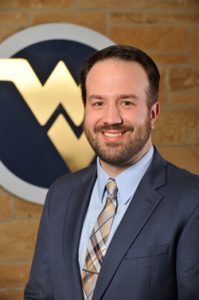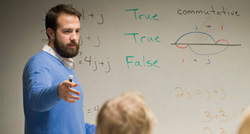Following is one of 28 first-person alumni profiles that were compiled in a photo book for the Park Foundation Trustees in September 2016. Each alumnus was ask to share highlights of his or her path from receiving the Park Scholarship to the present day.
Name: Dr. Matthew Campbell ’05
High school: Patchogue-Medford High School
Hometown: Patchogue, New York
Undergraduate field(s) of study: Mathematics and Mathematics Education
Additional degrees: M.S., North Carolina State University, 2009; Ph.D., Oregon State University, 2014
Current place of residence: Morgantown, West Virginia
Current job title and employer: Assistant Professor of Mathematics Education at West Virginia University
As a tenure-track faculty member at a research-intensive and land-grant institution (much like NC State), I have responsibilities and involvement in the areas of research, teaching, and service. In my area of mathematics teacher education and based on my interests, those three areas overlap significantly—all directed toward an effort to transform teacher preparation in this country to provide the best possible school experiences for all students.
As a researcher, I do empirical work to better understand the skills teachers need to engage their students in more rigorous and relevant mathematical work—discussing mathematical ideas, working on complex problems, and developing deep and connected understandings of mathematical concepts. From that, I work to understand how teachers develop those skills, asserting that great teachers are not born but must be developed. In doing so, I also work to understand the role of various institutions and stakeholders in teacher certification and teacher development in order to influence policy and program design. Because of my current position, I do this work while attending to the unique needs of rural, Appalachian communities. I have presented my work at numerous state, national, and international conferences and have had my writing published in academic and practitioner journals.
As an educator, I work with prospective and practicing middle and high school mathematics teachers—applying ideas from research to support their professional growth. I also work with prospective researchers, focusing on research methods in education and inquiry in the area of mathematics teacher development. Finally, I provide service to the field of education, in part, by working with teachers across the state and region, supporting them in their practice and engaging with and learning from their students. I also work with stakeholders and policymakers to inform decisions about K-12 mathematics education. Among the many ways to be involved and invested in education, I believe I hold a unique position because of my ability to be engaged across research, teaching, and service.
I came to NC State as a 17-year-old interested in becoming a high school mathematics teacher. In addition to the outstanding mathematics education program I worked through at NC State, the Park Scholarship afforded me opportunities that proved to be invaluable. Specifically, the opportunity to work with a faculty mentor in my field of interest (Dr. Hollylynne Lee) enabled me to learn about the scholarly field of mathematics education. During my undergraduate experience, I was able to learn about my mentor’s research, conduct research on my own practice, and present findings at state conferences.
After a few years of teaching high school mathematics, it was because of those experiences and the personal and professional connections I had made that I had the opportunity (and desire) to begin graduate school. Fifteen years after starting my time at NC State and as a Park Scholar, it is hard to remember being that 17-year-old with no sense of the range of professional and academic possibilities in the area of education. What is easy to remember, though, is the central role that the Park Scholarships program played in opening up the opportunities that have led me to where I am today. While the impact one can have as a high school mathematics teacher should not be understated, I am now in a position in which I can begin to make wide-ranging and large-scale impacts in the area of education and to pursue leadership roles in higher education and in the field of teacher education. I also wonder how my story serves as a contribution to a program like the Park Scholarship. So few Park Scholars focus on education (at least initially), perhaps because becoming a classroom teacher is seen as the endpoint. I hope that I can serve as an example for that next 17- or 18-year-old, who now can have a more diverse set of ideas of what it means to be in the field of education.
Thank you to the Park Foundation and its Board of Trustees for their historic support of the Park Scholarships program at NC State. Throughout my academic and professional career, I have continued to identify myself—first and foremost—as a member of the NC State and Park Scholarships families. This speaks to the tremendous opportunities I was provided and the financial, professional, and personal supports that are unique to the Park Scholarships program. Those opportunities and supports undoubtedly had an impact on my current and future endeavors. And none of that would have been possible without the generosity and vision of the Park Foundation and the continued value placed in the program by the Board of Trustees. I am forever indebted and grateful, and I use that as motivation to continue to grow and make an impact.
posted 2016.10.31

